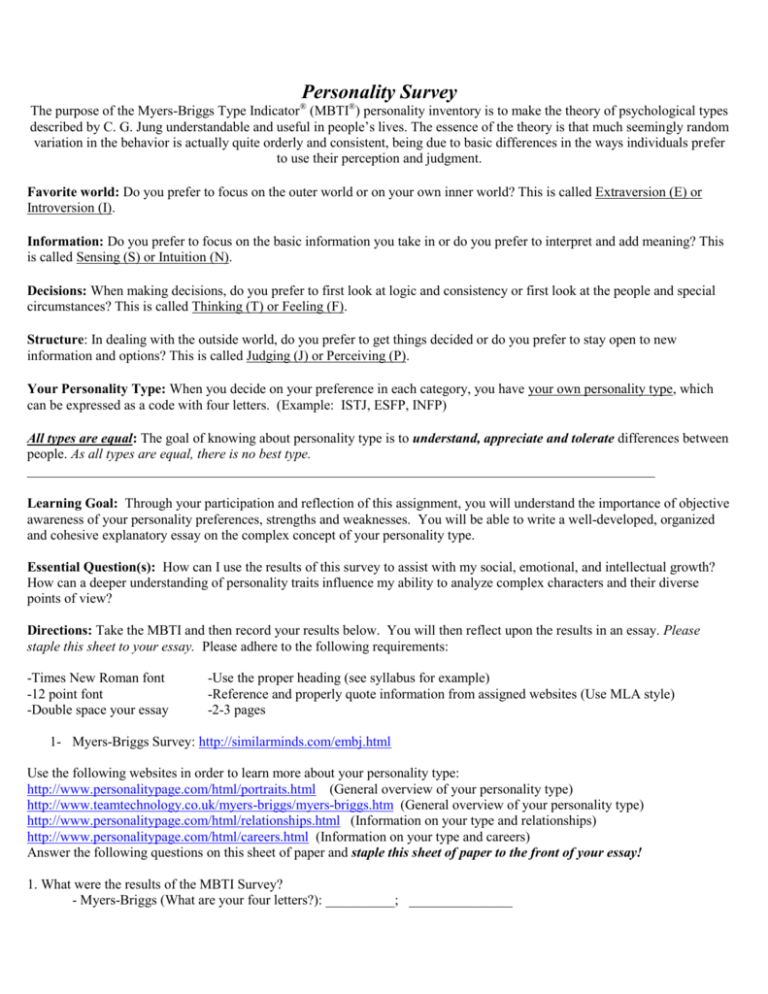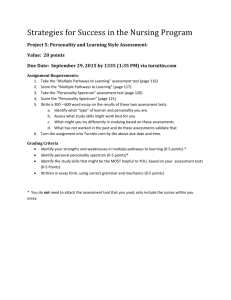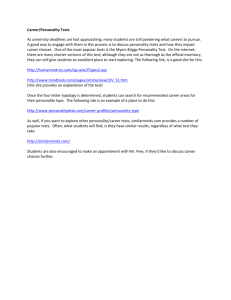Myers-Briggs Personality Test
advertisement

Personality Survey The purpose of the Myers-Briggs Type Indicator® (MBTI®) personality inventory is to make the theory of psychological types described by C. G. Jung understandable and useful in people’s lives. The essence of the theory is that much seemingly random variation in the behavior is actually quite orderly and consistent, being due to basic differences in the ways individuals prefer to use their perception and judgment. Favorite world: Do you prefer to focus on the outer world or on your own inner world? This is called Extraversion (E) or Introversion (I). Information: Do you prefer to focus on the basic information you take in or do you prefer to interpret and add meaning? This is called Sensing (S) or Intuition (N). Decisions: When making decisions, do you prefer to first look at logic and consistency or first look at the people and special circumstances? This is called Thinking (T) or Feeling (F). Structure: In dealing with the outside world, do you prefer to get things decided or do you prefer to stay open to new information and options? This is called Judging (J) or Perceiving (P). Your Personality Type: When you decide on your preference in each category, you have your own personality type, which can be expressed as a code with four letters. (Example: ISTJ, ESFP, INFP) All types are equal: The goal of knowing about personality type is to understand, appreciate and tolerate differences between people. As all types are equal, there is no best type. ___________________________________________________________________________________________ Learning Goal: Through your participation and reflection of this assignment, you will understand the importance of objective awareness of your personality preferences, strengths and weaknesses. You will be able to write a well-developed, organized and cohesive explanatory essay on the complex concept of your personality type. Essential Question(s): How can I use the results of this survey to assist with my social, emotional, and intellectual growth? How can a deeper understanding of personality traits influence my ability to analyze complex characters and their diverse points of view? Directions: Take the MBTI and then record your results below. You will then reflect upon the results in an essay. Please staple this sheet to your essay. Please adhere to the following requirements: -Times New Roman font -12 point font -Double space your essay -Use the proper heading (see syllabus for example) -Reference and properly quote information from assigned websites (Use MLA style) -2-3 pages 1- Myers-Briggs Survey: http://similarminds.com/embj.html Use the following websites in order to learn more about your personality type: http://www.personalitypage.com/html/portraits.html (General overview of your personality type) http://www.teamtechnology.co.uk/myers-briggs/myers-briggs.htm (General overview of your personality type) http://www.personalitypage.com/html/relationships.html (Information on your type and relationships) http://www.personalitypage.com/html/careers.html (Information on your type and careers) Answer the following questions on this sheet of paper and staple this sheet of paper to the front of your essay! 1. What were the results of the MBTI Survey? - Myers-Briggs (What are your four letters?): __________; _______________ 2. (HW: 10 pts) Show at least one family member the results of your survey and provide them with information about your personality. Have them answer the following questions. Family member name:____________________________________ 1. Does this personality portrait describe your student? Why or why not? 2. How can you use this information to further understand your student? 3. (Optional) Did you take the survey? What were your results? How can you use the information found in your personality to help you better understand and relate to your student? Writing the Essay: This is an explanatory essay so you will want to examine and convey the complex ideas and concepts that make up your personality type. Reflect upon the results of your survey. This essay should demonstrate important connections and distinctions between what your sources state, and what you know about yourself. Organize your ideas with a clear introduction, body paragraphs, and a conclusion. Develop your responses with well-chosen, relevant, and sufficient facts, extended definitions, concrete details, quotations or other information about your personality type. You might want to consider focusing your essay upon some of the following areas: Were you surprised at the results of the surveys? Why/why not? Be specific and use examples from your life to support your assertions. Make specific reference to the information provided in the explanation of your personality types. Do you feel the results of the survey are accurate to who you are as a person? Make specific reference to the information provided in the explanation of your personality type and argue why or why not? What strengths and/or weaknesses do you agree/disagree with and why? How can the information provided to you help you develop greater self-acceptance and awareness concerning your social, emotional and/or intellectual growth? Be specific and use examples to support your assertions. What do the results indicate about your career/interest preferences? How can this information help you? How did the results of the surveys make you feel? Did the results provide you with information that makes you uncomfortable or defensive? Why/why not? Be specific and use examples to support your assertions! Are there aspects of your results you would like to change? Why do you want to change them and what impact will the changes have on your life? If there are no changes, why are you content with these aspects of your personality? Once again, make specific reference to the information provided in the explanation of your personality type. Extra Credit: Create a visual component to express your personality type. This can be a collage, a drawing, photograph, a song, a PowerPoint Presentation, a Prezi, a performance, a graph, a chart)







